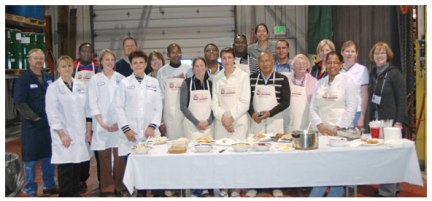The World Experiences US Dehy: USPB Hosts Workshop for International Guests
The World Experiences US Dehy: USPB Hosts Workshop for International Guests

For the third year running, the United States Potato Board (USPB) hosted guests from select international private voluntary organizations (PVOs) for a workshop to introduce US dehydrated potatoes (dehy) as a sensible solution to food programming. The workshop started in Idaho Falls, ID, and finished with the 2009 United States Agency for International Development (USAID) and USDA sponsored International Food Aid Conference (IFAC) in Kansas City, MO.
T.K. Kuwahara, USPB International Marketing Manager of Dehy, introduced the USPB and its programs designed to support PVOs in their food programming efforts. Dehydrated potatoes, a commodity available to PVO’s through USDA and USAID programs, was also introduced. Dehy is often overlooked due to the fact PVO’s are not aware of its benefits.
“Dehy is convenient, nutritious, versatile, and economical for use in food programming,” Kuwahara said. “You can’t get all of benefits of dehy from a list of commodities, so we invite the PVO’s to learn firsthand how they can incorporate dehy to support programs such as the health recovery of people living with HIV/AIDS, to school feeding programs with sustainability features of Parent Teacher Organizations (PTOs), to food aid for emergency relief work.”
Cade Fields-Gardner, a dietitian and nutrition consultant presented the various nutrition features of dehy and the role US dehy can play in maintaining and restoring nutritional health. Features of particular interest included US dehy’s resistant starches, vitamin and mineral content—especially potassium and vitamin C— and versatility in meeting the specific consistency needs and preferences of all age groups.
The PVO guests toured Rigby Produce, a fresh pack facility in Rigby, ID, where they learned about potato production including various aspects of soil conditions, planting, harvesting, storing and processing. They then toured Idaho Pacific, a dehydrated potato product producer, to learn how potatoes are processed into a wide range of dehydrated products. The group was extremely impressed to learn about the high food safety standards implemented in processing dehy. The fact that dehy is “made to order” once they request it, not sub-par product which has been sitting in a warehouse for years, was equally important to them. 
At Miles Willard Technologies, a research and development company specializing in food product development with dehydrated potatoes, the tour group participated in a simulated field experience. This included instruction on basic rehydration methods and techniques for both flakes and granulated dehydrated potatoes.
“The creativity flowed when the group was formed into three teams to produce meals from flakes and granules,” Kuwahara said. “Each team produced meals using dehy after discussing possible target beneficiaries, the types of local foods that might be available, local taste preferences in target countries and how dehy can be incorporated to provide meals that are nutritious, culturally acceptable, and easy to prepare.”
Eight international guests from four PVOs and two guests from US PVO headquarters attended the USPB Dehydrated Potato Workshop. Among the PVOs participating this year were Africare, Catholic Relief Services (CRS), the International Partnership for Human Development (IPHD), Joint Aid Management (JAM), and the Adventist Development Relief Agency (ADRA).
Countries represented at the USPB Dehydrated Potato Workshop included Madagascar, the Republic of Congo, Burkina Faso, Guinea Bissau, Angola, Mali, Cameroon, and Malawi. USPB International Marketing Co-Chairwoman Cheryl Koompin, American Falls, ID, and USPB International Marketing Administrative Committee Member Molly Connors, Pasco, WA, also joined the workshop.
“The participants found the workshop to be ‘a great learning experience’,” Kuwahara said. “They were surprised and pleased to learn US dehy is so nutritious, energy saving, and versatile. Each participant identified areas in which US dehy could be programmed as a part of their food distributions.”
After the USPB Dehydrated Potato Workshop, the PVO guests then traveled to the IFAC where they attended meetings, had networking opportunities, and presented their experiences to their attending headquarters personnel. Plans were made for follow-up and to maintain contact with each other as newfound colleagues and friends.









